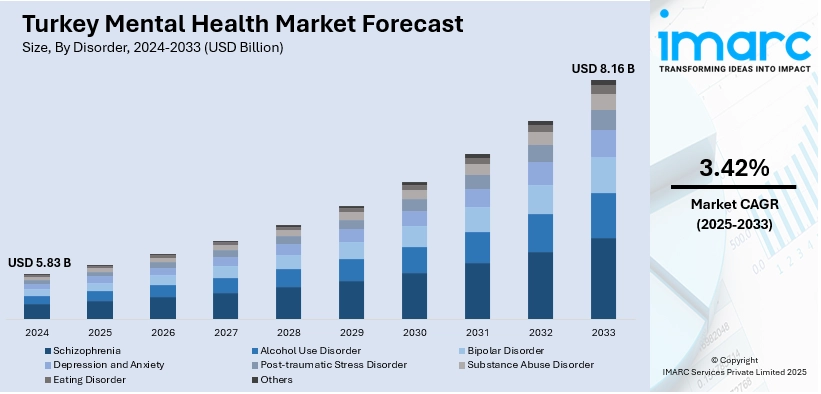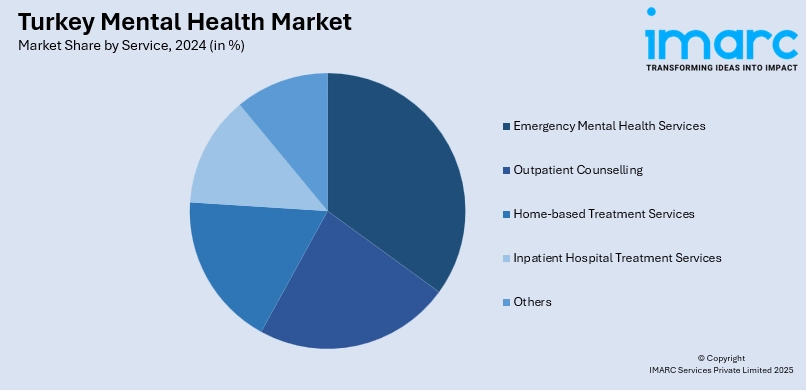
Turkey Mental Health Market Size, Share, Trends and Forecast by Disorder, Service, Age Group, and Region, 2025-2033
Turkey Mental Health Market Overview:
The Turkey mental health market size reached USD 5.83 Billion in 2024. The market is projected to reach USD 8.16 Billion by 2033, exhibiting a growth rate (CAGR) of 3.42% during 2025-2033. The market is fueled by growing acceptance and awareness regarding mental illness, which is supported by national policy and public health campaigns to reduce the stigma. Along with this, the growing incidence of depression, anxiety, and post-traumatic stress disorder is driving the demand for services. Also, improvements in telepsychiatry and online mental health platforms are improving accessibility and augmenting the Turkey mental health market share.
|
Report Attribute
|
Key Statistics
|
|---|---|
|
Base Year
|
2024
|
|
Forecast Years
|
2025-2033
|
|
Historical Years
|
2019-2024
|
| Market Size in 2024 | USD 5.83 Billion |
| Market Forecast in 2033 | USD 8.16 Billion |
| Market Growth Rate 2025-2033 | 3.42% |
Turkey Mental Health Market Trends:
Digital Transformation in Mental Healthcare
The market is undergoing a significant shift due to the growing adoption of digital tools and telehealth platforms. Telepsychiatry and mental health mobile apps have gained widespread popularity, especially COVID-19 pandemic accelerated the demand for remote and flexible healthcare. These technologies are facilitating greater accessibility for people living in remote or underserved areas where mental health services have historically been scarce. Aside from video consultations and online therapy websites, AI-based mental health software is rising to help with initial evaluations, mood monitoring, and tailored intervention techniques. According to an industry report, at the beginning of 2025, Turkey had 77.3 million internet users, with an internet penetration rate of 88.3%. The rising digital literacy among Turkey's younger population and widespread smartphone penetration are further supporting this transformation. Moreover, healthcare institutions and startups are increasingly collaborating to develop localized solutions that are culturally appropriate and compliant with national health regulations. The Turkish Ministry of Health's openness to integrating digital services within the broader healthcare ecosystem is expected to further encourage the scalability and institutional adoption of these innovations.

To get more information on this market, Request Sample
Growing Youth-Centric Mental Health Awareness
There is a significant rise in mental well-being consciousness among Turkey's youth, which is shaping the need for specialized psychological care services. Social change, academic pressure, economic instability, and excessive exposure to digital technology are driving forces behind the increasing rate of anxiety, depression, and behavioral disorders among this age group. As per an industry report, in 2024, nearly 38% of Turkey's population suffered from mental health problems. Among 16 nations surveyed, Turkey ranked second, after the United States. In response, the public and private sectors are launching mental health literacy campaigns with schools and universities in their sights, with the intent of de-stigmatizing mental illness and promoting early intervention. Furthermore, schools are starting to add on-campus counseling services and peer-support programs, indicating a more preventive strategy in the management of youth mental illness. Social media and influencers have also helped normalize dialogue on mental health among teenagers and young adults. Concurrently, training programs for youth-focused mental health professionals are being increased, with a special focus on culturally responsive care. This is transforming a consumer base that is more educated, active, and open to seeking professional assistance when necessary.
Integration of Mental Health into Primary Care
Turkey is witnessing increased integration of mental health services into its primary healthcare system, driven by the government's strategic goal of improving accessibility and early intervention. This, in turn, is contributing to the Turkey mental health market growth. Moreover, this strategy allows for family doctors and general practitioners to perform initial mental health screening and offer basic therapeutic advice, thereby managing mild to moderate cases without direct specialist referral. By integrating mental health care into regular check-ups, the system avoids stigma and promotes a more integrated approach to patient care. In addition to this, primary care provider training programs incorporate mental health modules to strengthen diagnostic proficiency and referral effectiveness. This integration makes a significant difference in rural and semi-urban regions, where psychiatric services are limited. Moreover, the national health insurance system is being streamlined to cover mental health consultations under the primary care setting, making such care more affordable financially. The model also accommodates ongoing monitoring and follow-up of patients, with those having chronic mental health illnesses provided with prolonged and coordinated care.
Turkey Mental Health Market Segmentation:
IMARC Group provides an analysis of the key trends in each segment of the market, along with forecasts at the country and regional levels for 2025-2033. Our report has categorized the market based on disorder, service, and age group.
Disorder Insights:
- Schizophrenia
- Alcohol Use Disorder
- Bipolar Disorder
- Depression and Anxiety
- Post-traumatic Stress Disorder
- Substance Abuse Disorder
- Eating Disorder
- Others
The report has provided a detailed breakup and analysis of the market based on the disorder. This includes schizophrenia, alcohol use disorder, bipolar disorder, depression and anxiety, post-traumatic stress disorder, substance abuse disorder, eating disorder, and others.
Service Insights:

- Emergency Mental Health Services
- Outpatient Counselling
- Home-based Treatment Services
- Inpatient Hospital Treatment Services
- Others
A detailed breakup and analysis of the market based on the service have also been provided in the report. This includes emergency mental health services, outpatient counselling, home-based treatment services, inpatient hospital treatment services, and others.
Age Group Insights:
- Pediatric
- Adult
- Geriatric
The report has provided a detailed breakup and analysis of the market based on the age group. This includes pediatric, adult, and geriatric.
Regional Insights:
- Marmara
- Central Anatolia
- Mediterranean
- Aegean
- Southeastern Anatolia
- Blacksea
- Eastern Anatolia
The report has also provided a comprehensive analysis of all the major regional markets, which include Marmara, Central Anatolia, Mediterranean, Aegean, Southeastern Anatolia, Blacksea, and Eastern Anatolia.
Competitive Landscape:
The market research report has also provided a comprehensive analysis of the competitive landscape. Competitive analysis such as market structure, key player positioning, top winning strategies, competitive dashboard, and company evaluation quadrant has been covered in the report. Also, detailed profiles of all major companies have been provided.
Turkey Mental Health Market News:
- The World Health Organization announced the completion of "Build Better Before: Scaling Up Capacity for Mental Health and Psychosocial Support (MHPSS) Preparedness Workshop and Full‑scale Simulation Exercise" held in Ankara, Türkiye, from 28–31 October 2024. Over 60 humanitarian professionals and emergency responders from 26 countries participated in interactive training and realistic scenario-based exercises to enhance readiness for mental health emergencies. The event, supported by Turkish health ministries, the EU, and USAID, reinforced global commitments to integrate MHPSS into emergency response systems.
Turkey Mental Health Market Report Coverage:
| Report Features | Details |
|---|---|
| Base Year of the Analysis | 2024 |
| Historical Period | 2019-2024 |
| Forecast Period | 2025-2033 |
| Units | Billion USD |
| Scope of the Report |
Exploration of Historical Trends and Market Outlook, Industry Catalysts and Challenges, Segment-Wise Historical and Future Market Assessment:
|
| Disorders Covered | Schizophrenia, Alcohol Use Disorder, Bipolar Disorder, Depression and Anxiety, Post-traumatic Stress Disorder, Substance Abuse Disorder, Eating Disorder, Others |
| Services Covered | Emergency Mental Health Services, Outpatient Counselling, Home-based Treatment Services, Inpatient Hospital Treatment Services, Others |
| Age Groups Covered | Pediatric, Adult, Geriatric |
| Regions Covered | Marmara, Central Anatolia, Mediterranean, Aegean, Southeastern Anatolia, Blacksea, Eastern Anatolia |
| Customization Scope | 10% Free Customization |
| Post-Sale Analyst Support | 10-12 Weeks |
| Delivery Format | PDF and Excel through Email (We can also provide the editable version of the report in PPT/Word format on special request) |
Key Questions Answered in This Report:
- How has the Turkey mental health market performed so far and how will it perform in the coming years?
- What is the breakup of the Turkey mental health market on the basis of disorder?
- What is the breakup of the Turkey mental health market on the basis of service?
- What is the breakup of the Turkey mental health market on the basis of age group?
- What is the breakup of the Turkey mental health market on the basis of region?
- What are the various stages in the value chain of the Turkey mental health market?
- What are the key driving factors and challenges in the Turkey mental health market?
- What is the structure of the Turkey mental health market and who are the key players?
- What is the degree of competition in the Turkey mental health market?
Key Benefits for Stakeholders:
- IMARC’s industry report offers a comprehensive quantitative analysis of various market segments, historical and current market trends, market forecasts, and dynamics of the Turkey mental health market from 2019-2033.
- The research report provides the latest information on the market drivers, challenges, and opportunities in the Turkey mental health market.
- Porter's five forces analysis assist stakeholders in assessing the impact of new entrants, competitive rivalry, supplier power, buyer power, and the threat of substitution. It helps stakeholders to analyze the level of competition within the Turkey mental health industry and its attractiveness.
- Competitive landscape allows stakeholders to understand their competitive environment and provides an insight into the current positions of key players in the market.
Need more help?
- Speak to our experienced analysts for insights on the current market scenarios.
- Include additional segments and countries to customize the report as per your requirement.
- Gain an unparalleled competitive advantage in your domain by understanding how to utilize the report and positively impacting your operations and revenue.
- For further assistance, please connect with our analysts.
 Request Customization
Request Customization
 Speak to an Analyst
Speak to an Analyst
 Request Brochure
Request Brochure
 Inquire Before Buying
Inquire Before Buying




.webp)




.webp)












